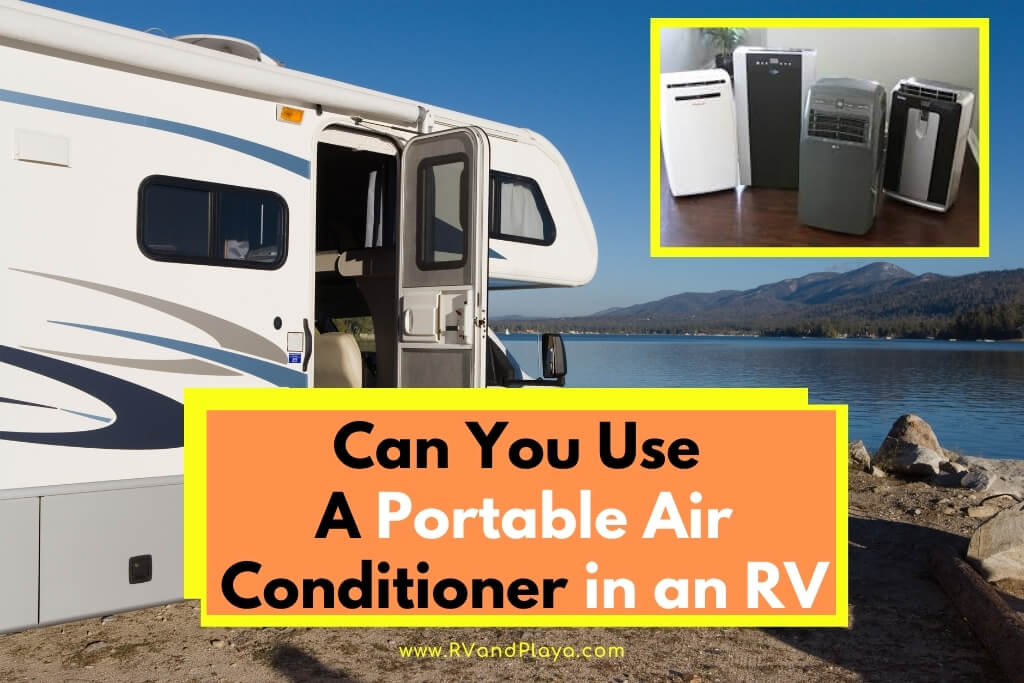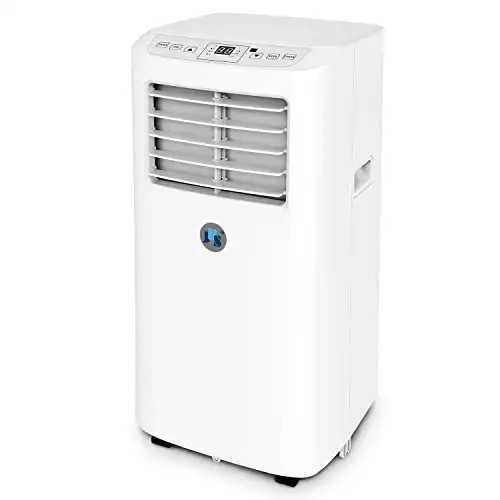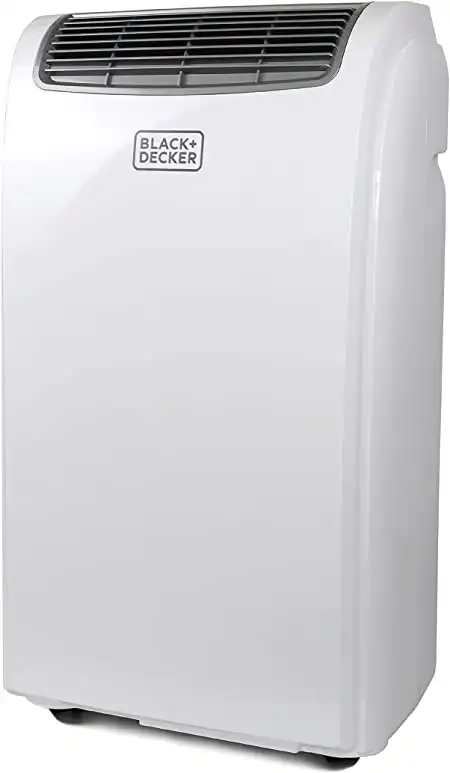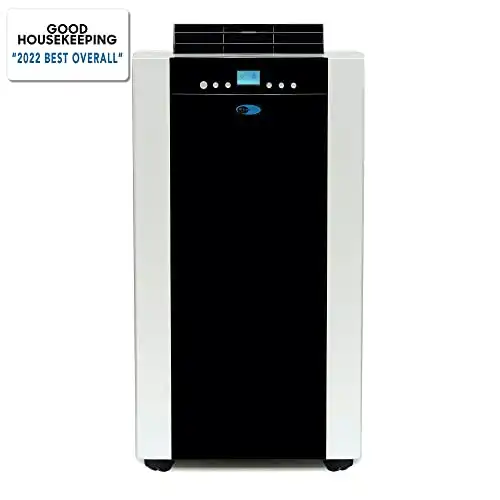If you’re an avid, casual, or first-time traveler with an RV, you’ll want to stay cool with a portable air conditioner. Air conditioning will keep you comfortable while you travel through warmer climates.
If you want to stay cool and comfortable on your journey, a portable air conditioner will make your trip feel like paradise.
Can you use a portable Air conditioner in an RV or Camper? Yes, you can safely use a portable air conditioner in an RV while traveling. Portable air conditioners are an easy and affordable option for those who want to beat the heat while traveling.
Choosing the correct portable air conditioner is extremely important, as there are different functions and settings for every device.
If you’re looking for a new AC to keep things cool while you’re on the go in your RV, this article is for you. If you’re looking for a replacement AC for your RV, this article is for you, too.
Keep reading for everything you need to know about using a portable air conditioner in an RV.
Table of Contents
Can You Use a Portable Air Conditioner in an RV?
You can safely use a portable air conditioner in an RV while traveling. A portable air conditioner is a quick and affordable option for keeping your RV cool and escaping the heat.
Nothing is worse than traveling while it’s hot and not being able to take a break from the high temperatures.
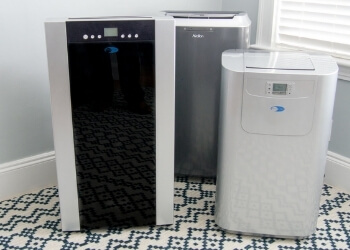
However, you must ensure that you purchase an air conditioner with enough BTU power to cool off your entire RV.
You don’t want to purchase a weak portable air conditioner that can’t cool all rooms in your RV, and you should not have to sacrifice comfort by purchasing the wrong portable air conditioner.
First, you need to identify the square footage of your RV. This will help determine the BTU needed to stay cool during your travels.
Once the square footage is determined, you can refer to this chart that outlines standard RV sizes and BTU requirements:
| Room Size in Feet | Area in Square Feet | Amount of BTU Needed |
|---|---|---|
| 20 x 30 | 600 | 14,000 |
| 20 x 20 | 400 | 12,000 |
| 15 x 20 | 300 | 10,000 |
| 10 x 20 | 200 | 8,000 |
Once you’ve analyzed your RV square footage and BTU needs, you will want to decide on pursuing extra functions for your portable air conditioner.
Some portable air conditioners come with a built-in dehumidifier, and this is especially beneficial for those who want to escape the heat and the humidity.
What Are The Different Types of RV Portable Air Conditioner?
There are four different kinds of air conditioning units that you can pick from for your RV. Let’s jump straight into the details; we don’t want to waste your time after all!
1. Rooftop Air Conditioner
Since this one lives on the roof, you won’t have to worry about it taking up crucial floor space. They can typically cool a room that measures 10 by 50 feet.
Just bear in mind that you’ll probably need a pro to help you out.
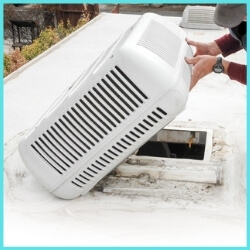
2. Vent Free Air Conditioner
These guys look super stylish. However, if you live in a humid climate, the cooling effect will be negated since they use evaporated water to chill the space.
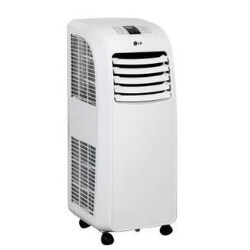
3. Vented Air Conditioner
You must place these under a window so the hose can lead outside. If yours has only one hose, improper ventilation is very likely.
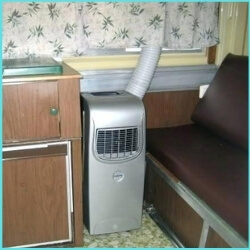
4. Window Air Conditioner
These don’t take up space since they’re installed on the outside. Not to mention that they’re easy to maintain.
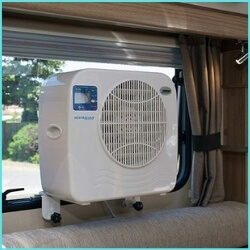
How Much Does It Cost to Replace an RV Air Conditioner?
How much does it cost to replace an RV air conditioner? Generally, prices start at $200 and continue to rise into the thousands. As you can probably imagine, the cost of replacing an RV air conditioner varies depending on the style and type of unit you’re after.
Having said this, you might get lucky if you have a peek on Craigslist or eBay.
You will often find RV air conditioning models for a very good discount on these sites.
However, you need to be careful that they are still in working order as you don’t want to be ripped off!
Best Portable Air Conditioner for RV
Deciding on a portable air conditioning unit for your RV requires an understanding of how these units work and what’s needed for your specific RV.
To help you make the wisest investment possible, I’ve done the research to compile a list of the 3 best RV portable air conditioners.
So, here are my top 3 best RV Portable Air Conditioners:
|
The JHS 8,000 BTU portable air conditioning unit is a budget-friendly option for RVers that still want a high-performance portable air conditioner. With 8,000 BTUs, this unit is rated to provide air circulation, cooling, and dehumidifying for spaces up to 170 square feet. |
If you’re looking for a portable RV air conditioning unit that walks the perfect line between performance and affordability, the best portable A/C for RV is the Black + Decker BPACT10WT Portable Air Conditioner. |
Those searching for a portable air conditioner that can function to cool their RV, remove excess moisture from their space, or simply provide extra air circulation should look closer at the Whynter ARC-14S portable A/C unit. |
The JHS 8,000 BTU portable air conditioning unit is a budget-friendly option for RVers that still want a high-performance portable air conditioner.
With 8,000 BTUs, this unit is rated to provide air circulation, cooling, and dehumidifying for spaces up to 170 square feet.
If you’re looking for a portable RV air conditioning unit that walks the perfect line between performance and affordability, the best portable A/C for RV is the Black + Decker BPACT10WT Portable Air Conditioner.
Those searching for a portable air conditioner that can function to cool their RV, remove excess moisture from their space, or simply provide extra air circulation should look closer at the Whynter ARC-14S portable A/C unit.
How Much Electricity Will My Portable Air Conditioner Use?
The amount of electricity and power that a portable air conditioner will use depends on its BTU levels.
A portable air conditioner with 15,000 BTU requires about 3200 to 3500 watts of power, while a 10,000 BTU air conditioner needs about 1900 to 2050 watts to start-up and cool down your RV.
You’ll want to ensure that your generator can keep-up with the requirements of a portable air conditioner before purchasing one.
Read also: This Is What Happens to Solar Power When Batteries Are Full? – (FACTS)
A great way to combat your portable air conditioner’s electricity usage is to install solar panels on the roof of your RV.
Solar panels will lower your electricity usage, extend the life of your RV’s battery, and they are virtually maintenance-free.
Typically, RV users install one to three solar panels that measure at 100 watts each to maximize their electrical savings.
Combining the cost-effective solar panels with the affordable portable air conditioner will maximize your savings and give you peace of mind about your carbon footprint and your purchases.
Pros and Cons of A Portable Air Conditioner
Portable air conditioners are ideal for their movability within the RV.
They are not a permanent addition, and during the colder months, you can replace your portable air conditioner with a portable heater.
Pros
This makes them appealing to travelers who are looking for a simple solution to beat the heat, and who are not interested in permanent additions.
In addition to this, portable air conditioners are incredibly affordable. While other air conditioning options, such as RV roof air conditioners, can cost anywhere from $4,000 to $9,000, most portable air conditioners cost around $300.
However, the cost depends on the amount of BTU needed, and prices may vary based on these requirements.
Cons
Since portable air conditioners don’ have a designated space in the window or roof of the RV, they will require you to dedicate some extra space for their operation.
This can be problematic if you do not have a lot of room in your RV for extra stuff and may send you running for an air conditioner that can be stored away.
However, portable air conditioners only require about a square foot or two of space, and being the most affordable option, a compromise isn’t totally out of the question.
Another negative aspect of owning a portable air conditioner for your RV is user error. Sometimes, users will not correctly assemble the nozzle of the portable air conditioner, and this will cause warm air to seep into your RV.
Read also: Do RV Thermostats Go Bad? How To Check It?
You’ll want to keep a portable thermometer in your RV to keep track of temperature changes and quickly correct any errors that may hinder your portable air conditioner’s ability to operate.
Read also: Is an RV Thermostat the Same as A House Thermostat? (What To Consider)
Tips and Tricks To Avoid The Heat In Your RV
If you’re traveling to an area where temperatures get famously hot, you may want to assist your portable air conditioner by purchasing metallic window coverings to reflect the heat and sunlight.
This will help cool your RV and allows your portable air conditioner to work more quickly.
Read: Can You Use a Humidifier in an RV and How to Control It?
By allowing your portable air conditioner to work with ease, it won’t require as much power and electricity to keep your RV cooled down.
You will want to crank your AC early in the day before it gets hot because your floors and ceilings will cool more quickly.
This will help your air conditioning unit use less electricity and will ensure that it runs smoothly.
If you try to cool down your RV when it is already warm outside, it may be more difficult and will require more generated power.
It’s also essential to ensure that your RV has proper ventilation before traveling.
Consistently checking your RV’s ventilation will help your portable air conditioner operate smoothly and will keep your RV from formulating an excess of dust and other particles that can contaminate the air.
Read also: This Is Why Your RV Air Conditioner Is So Loud – [Do This First]
Check your RV’s filters periodically to remove any blockages that would prevent proper and efficient circulation.
In addition to this, you might want to consider purchasing a door and window sweeps to prevent your AC from seeping through any exit points.
This will waste your generated AC and force your portable air conditioner to work harder than it needs to.
By covering areas that are prone to drafts, you can retain more AC in your RV and avoid unnecessary energy usage.
How Can I Keep My Baby Cool Without AC?
Keeping your baby cool is essential, and it’s no secret that this is hard to do if you don’t have an air conditioning unit. But try not to stress too much! It can be done.
Use a Fan
Whether it is a ceiling fan or a box fan, this can help to cool your baby’s room. Just be sure that it isn’t pointed directly at your little one while they’re asleep.
Dress Them Appropriately
Consider the thickness of their clothes. If it’s too hot for what they are wearing, make sure to change them.
Make Sure They’re Hydrated
Adopt a “little and often” feeding schedule. This will ensure your bundle of joy stays properly cool and hydrated.
Are Portable Air Conditioners Worth It?
To tell you the truth, it really depends on your needs and wants.
Many RV owners prefer portable AC units over window ones as they don’t block out the natural light.
Plus, you don’t need to put any effort into the installation so it can be a good get up and go type of affair.
On the other hand, portable air conditioners are usually less efficient. They use far more electricity than standard ACs to cool the same sized room.
So, if you are trying to cut down on certain bills, portable air conditioning units may not be worth it. But, if you want something easy to use, then they are definitely worth it!
Is a Portable AC Better Than a Window Unit?
Let’s answer this in a table format, shall we? This will ensure you can clearly see the differences between the two types and come to your own answer. Deal?
| Portable Air Conditioning Unit | Window Air Conditioning Unit |
|---|---|
| Very easy to install | Doesn’t take up space as it’s mounted the outside of your RV |
| Can move it throughout the day | Can be installed outside a wall, therefore not requiring a window |
| More flexible than window units | Uses energy more efficiently |
| Can buy a ceiling vent kit if you’d rather install it closer to your RV’s roof | Comes with digital thermostats, timers, and remotes |
| Can come with a digital thermostat, timer, or remote |
How Long Does a Portable AC Take to Cool a Room?
How long does a portable AC take to cool a room? We have found that portable ACs tend to take roughly 20 minutes to cool a room down. This can vary and oftentimes will take far longer than this. Window units, on the other hand, generally cool an area within 15 minutes or less.
You must take the model’s rating into account here. Why? Because not all air conditioning units are created equally.
Some are meant for heating larger RV rooms, while others are strictly for smaller spaces.
Can You Run a Portable Air Conditioner 24/7?
Can you run a portable AC 24/7? Yes, technically, you can leave a portable air conditioner on all the time. However, it isn’t the best idea for the health of your unit. Why? As ACs cool, they begin to collect condensation. When you leave them on 24/7 this starts to become a problem as the build-up can cause the circuit to trip.
Furthermore, it will cost you a lot of money. Portable air conditioners use so much electricity (especially if you leave them running all the time).
The bill will be enough to put your off, we can almost guarantee it.
What Happens If You Don’t Vent a Portable Air Conditioner?
If you do not vent a portable air conditioner, it won’t work. That’s the short answer, but, let’s explain.
The units are supposed to cool down a room, right? Well, it needs to take the heat out of the air to do that.
However, if it is not vented outside of the area, the hot air will stay cooped up inside your RV. Thus, the room won’t cool down (it could even make it warmer).
Venting your AC will ensure it can remove the heat and moisture from your space.
Read also: 15 Effective Ways to Stop Condensation in Travel Trailers or RV
5 Reasons Why Your Portable AC Is Not Cooling Your Room
There are plenty of reasons why your portable AC isn’t cooling. But, we are going to focus on the 5 main causes.
- Obstructed air intake: Look for anything that could be obstructing the air intake. If you find some debris, simply take it out and voila!
- No power: Obviously, you need to ensure that you’ve turned it on and that the fuse isn’t blown.
- Dirty filter: Make sure to clean it regularly to stop this from affecting your ACs cooling ability.
- It’s too small for your RV: Some air conditioners are only meant for very small spaces. Check the box for the rating as you might need to be a heftier one.
- Overheated compressor: This prevents air from flowing through your AC.
Can I Run an Air Conditioner From An Inverter?
If you have a small inverter, it will be pretty hard to run your AC from it. They typically require 24 amps to start which is far too much for little inverters.
Can I run an an Air conditioner from an Inverter? Yes, you can use an inverter to run a new, efficient air conditioning unit for a short amount of time. An inverter will run a 120-volt load from a 12-volt battery. However, it has to draw a lot of power from the battery meaning that your AC won’t run for long on it.
Although, we suggest that you don’t rely on this option.
Related reading: Should an RV Inverter Be Left On? Does it Hurt the Battery?
Will a 2000 Watt Generator Run an RV Air Conditioner?
As you may now know if you read the previous answer, RV air conditioners tend to use a lot of power to start up and run.
You will be pleased to know, however, that a 2000 Watt generator will be enough to power it.
There are lots of generator sizes to choose from.
Related reading: How to Use a Generator with a Travel Trailer: Complete Guide
So, if you haven’t yet purchased one, we strongly suggest you buy a bigger model. Why? Because it’ll be far safer and you can guarantee that your RV AC will continue to work.
Do You Have to Use The Hose For a Portable Air Conditioner?
Do you have to use the hose for a portable air conditioner? In a word, yes. You cannot run a portable air conditioner without using the hose. Why? Because the unit utilizes this to discard the warm air (and the moisture) outside of your RV. Otherwise, it will stay inside and continue to warm the space which is exactly what you do not want.
As we mentioned earlier, you can buy ventless air conditioners.
However, these do not truly condition the air since the only way to do this is to physically extract the moisture.
Can You Put a Mini-Split In an RV?
Yes! To tell you the truth, a mini-split might be the perfect option for your RV.
You don’t need to put too much energy into the installation process and it is bound to fit perfectly in even the smallest spaces.
We imagine that you will be looking for the tiniest mini-split possible.
These tend to be the 9000 BTU models that will both heat and cool space of around 500 square feet or less. Just bear in mind that you need to supply a bit of electricity for it to work properly.
What Is The Smallest RV Air Conditioner?
The smallest RV air conditioners are the portable options. You will find that they are great for cooling rooms up to 250 square feet.
If your RV space is larger than this, then you’ll need to invest a bit more money into a larger model.
But anyway, let’s take a look at the 8000 BTU smallest RV air conditioners.
You might like to try to following models:
- Midea MPF08CR81-E 8000
- Danby 6000 BTU (yup, it’s tiny!)
- Shinco SPF2 8000 BTU
- Honeywell HL09CESWK 90000
Can I Run The Air Conditioner With Solar Power?
Can I run the air conditioner with solar panel? This is a tricky one because the answer is yes and no. Since ACs need a lot of power, your solar power panels will have to emit a load of energy to make it work.
And even if they can draw that much power, they will probably only run your AC for 4 hours. But, if that’s good enough for you then go for it!
Can I Run My RV Air Conditioner On 110?
We receive this question a lot, so it’s about time we answer it!
You can absolutely run your RV air conditioning unit on a 110 outlet. However, you shouldn’t have anything else plugged in when you are using the AC. Why? Because there is a good chance that you will overload the socket as these units tend to draw a lot of power.
Are Portable Air Conditioners Dangerous?
Are portable air conditioners dangerous? No. They’re 100% safe to use. However, you do need to make sure that you do not cover the unit and the hose vents the moisture outside of your RV.
As with anything, if you don’t take care during the setup, it will become increasingly more dangerous to use.
Final Thoughts
If you’re planning a camping trip and want to stay relaxed and comfortable, you should consider purchasing a portable air conditioner.
A portable air conditioner is a relatively simple solution, and it’s cost-effective, too.
References
Recent Posts
Is Toyota Remote Connect Free? (Subscription, Services Plans)
Does Toyota Remote Connect have an included trial? It used to be the case that, when you bought a new car, you made one straightforward payment and that was it. Now, it feels like there are...
Toyota Safety Connect: What It Is And Why You Need It? Whether you’re buying a new Toyota or you’ve had one for a while you will have been given the hard sell on their Connected Services but do...

